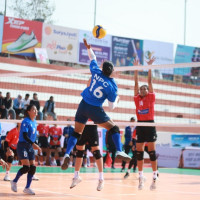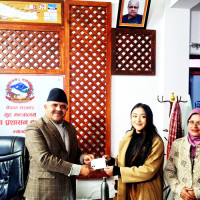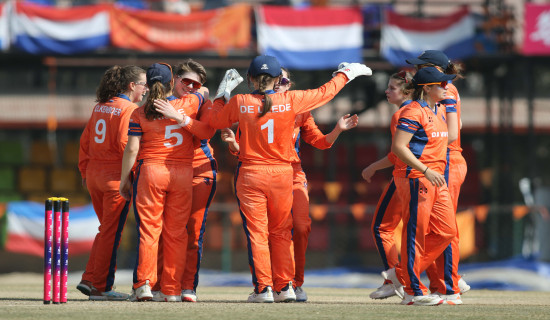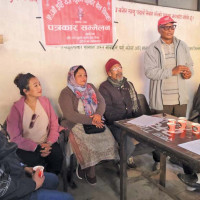- Friday, 23 January 2026
Wedding Album: An irony of reality and belief
Kathmandu, Oct. 3: The house is buzzing with wedding vibes. The youngest daughter of the Koirala family is getting married to a man based in the United States, who remains offstage. This pertains to the play ‘Wedding Album’, currently being staged at Kausi Theatre.
The wedding preparations for Bidushi (Ranjana Bhattarai) are in full swing. Mother Rukmani (Loonibha Tuladhar) and father Krishna Koirala (Aashant Sharma) are both excited and anxious about their youngest daughter’s wedding. This time, the parents plan to leave no stone unturned to make their daughter’s marriage a success. The eldest daughter, Hema (Kenipa Singh Pahari), who resides in Australia, has returned to attend her sister’s wedding. She looks somewhat envious because her own wedding did not receive that fanfare.
Rohit (Sudam CK) is also deeply involved in his sister’s wedding preparations. Although he has a Christian girlfriend, his relatives are persuading him to marry a Hindu girl named Sampada.
While the family accepts Rohit’s Christian girlfriend, his elder sister Hema is against the relationship of her brother with a Christian girl. She suggests he marry a Hindu girl instead.
Kusum (Sebita Adhikari), who has served the Koirala family as a house helper for 11 long years, adds a touch of humour to the narrative. The playful bickering between Rukmani and Kusum over how much salt or spice should be added to the curry provokes laughter from the audience.
Directed by Akanchha Karki ‘Wedding Album’ is adapted into Nepali by director Karki herself from the work of Indian actor and dramatist Girish Karnad.
The play delves into the intricacies of South Asian wedding planning. It showcases the stresses, joys and traditions of families during wedding preparations. The play delves into the readiness of educated and progressive South Asian families to fix marriages, relying solely on a matchmaker's recommendation.
The play also illustrates the impact of culture on individual choices. Despite Rohit's love for his Christian girlfriend, Jenny, he ends up marrying a Hindu girl.
The character of Hema throws a light on gender disparity. Although Hema has both a daughter and a son, she appears more concerned about her son. Through the character of Kusum, the play highlights the challenges faced by a single woman who, out of fear of losing her job, neglects her child.
The drama shows the challenges faced by married couples, many of whom remain in unhappy relationships for the sake of their children.
A central theme of the play is the stark contrast between appearance and reality. While all characters present themselves as modern and educated, their actions and beliefs are deeply rooted in the age-old societal norms. Despite being in a seemingly progressive environment, male chauvinism still casts a shadow. Women, though educated and outspoken, find themselves overshadowed by these patriarchal attitudes.
All the actors delivered commendable performances. The drama is so engaging that while watching, one might feel as if they are viewing a TV series. As the drama concludes, many in the audience yearn for a sequel.
The set, reminiscent of a flipping wedding album, draws the audience in, making them feel connected and often seeing their own stories reflected on stage. The effective use of humour, emotion, arguments, and satire makes the drama captivating from start to finish.
The play has an age restriction, and it is recommended for individuals aged 16 and older. The staging of the play began on September 21 and will continue till October 14.

















